SUMMARY
This is AI generated summarization, which may have errors. For context, always refer to the full article.

MANILA, Philippines – After much backlash from the public, the leadership of both the House of Representatives and the Senate have agreed to reallocate confidential funds from agencies not necessarily involved in surveillance to agencies fighting for fishermen’s rights, amid rising tensions in the West Philippine Sea.
This is well and good. Some observers note, however, that there remains the need to plug holes in policy that in the first place allowed the unprecedented rise in confidential fund spending.
Officials provided two explanations to justify the release of confidential funds to the Office of the Vice President (OVP) Sara Duterte in 2022, and they do not necessarily support each other:
- The first, which came from Marikina 2nd District Representative Estella Quimbo, is that there was an existing item, with “zero” allocation, that was augmented.
- The second, which was provided by Budget Secretary Amenah Pangandaman, is that because the money came from the contingent fund managed by the budget department, it was not considered an augmentation, and therefore did not fall under the constitutional prohibition.
Both explanations surface more worrisome issues. By pushing for a broad interpretation of the use of the contingent fund, Duterte’s defenders were in effect opening the floodgates for its misuse.
Unless Congress does anything about it, the explanations given could end up giving the Marcos administration license to spend more confidential funds than the P10.1 billion it is asking Congress for in 2024.
In fact, it is already happening – if the explanations for the release of P125 million in confidential funds to the OVP in 2022 are allowed to fly.
What’s legal, what’s not
At the heart of the issue is the question of how much leeway the President should have in implementing the national budget.
“The budget will always have areas of flexibility,” one former budget department insider explained. The source said that at one point there was even a debate over whether everything in the budget should have a line item. This is because “you don’t want to tie the hands of the executive in a way that makes it difficult to respond to new and urgent concerns.”
The budget, in fact, is structured so there is room for flexibility. The question, however, is the extent of “areas of discretion” that will be allowed.
At the Department of Budget and Management (DBM), there are those who say that, if something is not explicitly prohibited, it is allowed. But there are also those who insist that, if it is not explicitly stated, it is not allowed.
This brings us to the initial explanation that Quimbo used in an ANC interview, justifying the release of confidential funds to the OVP in 2022. She argued that this was allowed because a line item “existed” in the budget of the Office of the Vice President. It just happened that the allocation for that line item was zero.
She has since recalibrated this statement. She clarified that the line item in the OVP budget for 2022, augmented by the DBM through a transfer from contingency funds, was, in fact, the one on “Good Governance Engagements and Social Service Projects.”
“That is the existing line item, of which one of the objects of expenditure is confidential expense,” Quimbo, the sponsor of the budget, said on September 19.
Secret confidential funds?
Quimbo was alluding to the fact that agency budgets in the annual General Appropriations Act (GAA) are typically divided into the following sections: “(a) New Appropriations by Program, (b) Programs, and (c) New Appropriations, by Object of Expenditures.”
In the case of the 2022 OVP budget, it looks like this:
Each of these sections of the budget typically tally up the same, indicating that they are just different ways to slice the same pie. For the OVP budget for 2022, the tally for Programs is P702,035,000.
The section with heading “(c) New Appropriations, by Object of Expenditures” has the same summary: P702,035 in thousands.
For the fiscal year 2022, bulk of the “Programs” section were bucketed under “Good Governance Engagements and Social Service Projects” – the item Quimbo referred to – which amounted to P621,607,000. This can be found on page 22 of the GAA for 2022.
In defending the release of confidential funds to the OVP, however, Quimbo argued that only the program items in the budget were actually considered line items. She said the breakdowns under the heading “New Appropriations, By Object of Expenditure” were not.
There are a few problems with these arguments.
Absolutely nothing in the text of the OVP budget for 2022 specifically mentioned that the fund that Quimbo referred to included “confidential funds.”
The description of the line item that Quimbo was referring to did not mention it. Nor was it mentioned in the special provisions section, which governed the funds given to the OVP. It was not mentioned either in the section “New Appropriations, By Object of Expenditure.”
If the line item existed in the budget, where was it? Why was it not visible in the budget document?
How other agency budgets compare
By arguing that it was still possible for an office to spend substantial amounts of money on an object that was not mentioned in any of these sections of the budget, Quimbo was in effect saying that, moving forward, it would be possible for agencies to be given confidential funds even if it was not explicitly stated in the budget.
In the budget of the Office of the President (OP) for 2022, the description of programs also did not mention which programs had confidential funds.
However, under the “New Appropriations, by Object of Expenditures,” found on page 19 of the GAA, the amount P2.25 billion was indicated as allotted for “Confidential Expenses,” while another P2.25 billion was allotted for “Intelligence Expenses.” This was what expressly allowed the President to spend these enormous sums in confidential and intelligence funding for that year.
Other agency budgets which included confidential and intelligence funds mentioned confidential activities both in the line items under “Programs” as well as the section on “New Appropriations, by Object of Expenditures.”
This was the case for the budget of the Philippine National Police (PNP) for 2022. Apart from listing the funds under “New Appropriations, by Object of Expenditures,” the PNP budget also indicated program items that included confidential activities.
New appropriation, not augmentation
This brings us to the other justification for the release of the funds: the contingent funds.
Contingent funds were supposed to cover the funding requirements of “new or urgent activities or projects of national government agencies, GOCCs, and LGUs that need to be implemented or paid [for] during the year,” the budget document said.
The bone of contention was whether there were limits to what is allowed. The debate was rooted in the fact that, while the special provision governing these funds provided a list of three items that the funds could be spent on, it also said the list was “not limited to” the said three items.
The three items were:
- “(i) legal obligation of the government arising from final and executory decisions of competent authorities, such as compromise agreements, arbitral awards, mediation settlement agreement, and professional services in connection thereto
- “(ii) requirements of newly created offices
- “(iii) deficiencies in the appropriations for local and external travels of the President of the Philippines.”
In the plenary discussion, Quimbo argued for a broad interpretation of provisions governing the contingent funds. “Use of contingency funds,” she said, “so long as it is for urgent new activity or project of NGA, GOCCs, and LGUs that need to be implemented or paid within the year…is not limited to these three cases.”
She added, “There is broad application of these contingency funds, and the purpose is, it is to be used for contingency.”
Because the funds were supposedly for “new or urgent activities or projects,” Davao City 3rd District Representative Isidro Ungab reasoned that the release of confidential funds to the OVP from the contingent fund was in fact not an augmentation, which would have been a violation of the Constitution.
It was unclear just how new and urgent the activities were that the OVP wanted funding for. In explaining the release of confidential funds to the OVP from the contingent fund, DBM Secretary Pangandaman said the OVP’s confidential fund was for good governance and social services projects, including:
- The safe implementation of various projects and activities of the OVP across its satellite offices for the last quarter of FY 2022
- The conduct of its official engagements and functional representation in international and local events
- The implementation of various projects and activities relevant to national security and peace and order
- The implementation of the same with proper security and safety protocols for the benefit of the institution.
When she was asked by Senator Risa Hontiveros to explain how she used the confidential funds, Vice President Duterte herself said the funds went to various programs her office implemented, and they included tree planting and libreng sakay (free rides).
It was “a new appropriation, allowed under the contingent fund, which is a source of funding for government agencies that were not able to predict other expenses for the fiscal year,” Ungab argued.
Further, because it is a new appropriation from the contingency fund, Ungab said, “in this particular case, rules of augmentation do not apply.”
Blank check
The problem with that argument is that, again, nothing in the contingent fund, which amounted to P7 billion in 2022, was tagged as confidential funds.
Found in pages 755 and 756 of the 2022 GAA, the contingent fund is broken down into P4.5 billion in maintenance and operating expenses (MOOE) and P2.5 billion in capital outlay (CO) expenditures.
Under the section of the fund for “New Appropriations, By Object of Expenditure,” the MOOE part was further identified as “Financial Assistance/Subsidy.” There was no line for “Confidential Expenses.”
By pushing for this interpretation of the use of the contingent fund, Quimbo and Ungab were in effect opening the floodgates for its misuse.
It also begs the question: what other agency was given confidential funds even if they were not expressly allowed by Congress to have such funds?
And if it is possible for funds to be reclassified as confidential even if there was no express indication in the law, what other funds were given the same treatment? How much of the total annual expenses had been retagged as confidential, rendering them difficult to audit?
“There should be restrictions,” the budget department source said. “They should not be using the contingent fund for such a purpose. It should only be for urgent and needed items.”
This is particularly important given that a substantial portion of the proposed budget for 2024 is currently financed through deficit. Senator Ralph Recto earlier noted that “gross borrowings” represents 42% of the total budget for 2024. He noted that this means that, to finance the budget, the government needs to borrow P4 billion daily.
This is not a problem if the funds are going to services and new infrastructure that could eventually fuel economic growth. It is problematic if all that borrowing is going to be spent on expenses that are difficult to account for.
“This means taxpayers will not only have to pay for the actual amounts released for confidential funds, they will also have to pay for the interest on these expenses,” the former budget official said.
Proposed oversight, safeguards
What do all these mean? To protect the interest of taxpayers, it is not enough for Congress to realign confidential funds that do not serve a specific purpose. It also needs to put in place safeguards that would prevent the misuse of confidential and intelligence funds.
Among the proposals – ironically put forward by Quimbo – is the creation of an oversight committee that would monitor the use of confidential funds. It is a big question mark, however, if real oversight is possible in a situation where Congress has been practically captured by a powerful executive.
Oversight is one function that Congress has been failing at in the last several years. When the administration of Sara Duterte’s father, president Rodrigo Duterte, began proposing substantial increases to the confidential and intelligence funds starting in 2017, the legislature did not ask questions.
Another option, the budget source said, was suggested by Albay Representative Edcel Lagman: clarify in the provisions governing the confidential and intelligence funds which agencies might be entitled to such funds. Lagman also suggested adding restrictions on the use of the contingency funds.
Public opinion will play a big role here. Continued pressure from concerned citizens is critical to push Congress to add restrictions to the growth of these hard-to-audit funds and for the President to approve such restrictions. – Rappler.com
1 comment
How does this make you feel?
![[In This Economy] Why Marcos is getting high on unprogrammed funds](https://www.rappler.com/tachyon/2024/07/TL-marcos-program-funds-july-19-2024.jpg?resize=257%2C257&crop=265px%2C0px%2C720px%2C720px)
![[In This Economy] Is the Marcos government unlawfully dipping into PhilHealth funds?](https://www.rappler.com/tachyon/2024/07/marcos-government-philhealth-funds-july-12-2024.jpg?resize=257%2C257&crop=425px%2C0px%2C1080px%2C1080px)


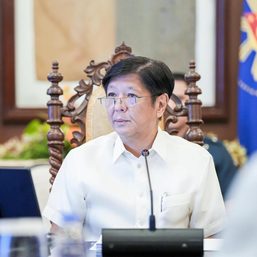

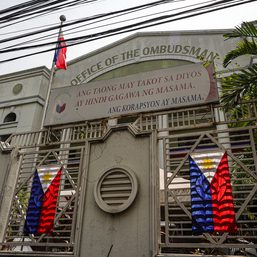
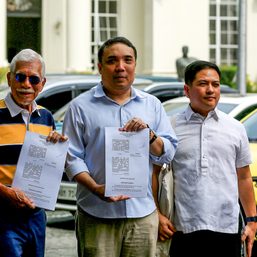



![[Just Saying] SONA 2024: Some disturbing points](https://www.rappler.com/tachyon/2024/07/TL-marcos-sona-points-july-23-2024.jpg?resize=257%2C257&crop=335px%2C0px%2C720px%2C720px)



![[OPINION] Does VP Sara Duterte have a game plan?](https://www.rappler.com/tachyon/2024/06/sara-duterte-game-plan-june-25-2024.jpg?resize=257%2C257&crop_strategy=attention)
![[Newsstand] What’s next for VP Sara: Go Macapagal or go Arroyo?](https://www.rappler.com/tachyon/2024/06/tl-vp-sara-duterte-go-macapagal-go-arroyo-1.jpg?resize=257%2C257&crop=412px%2C0px%2C1080px%2C1080px)

![[OPINION] Unpaid care work by women is a public concern](https://www.rappler.com/tachyon/2024/07/20240725-unpaid-care-work-public-concern.jpg?resize=257%2C257&crop_strategy=attention)

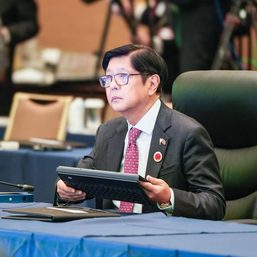

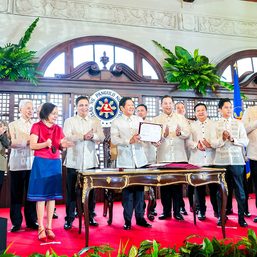
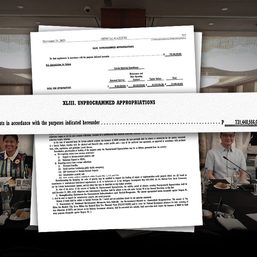



![[Rappler’s Best] Knowing when to leave](https://www.rappler.com/tachyon/2024/07/biden-sara-gfx.jpg?resize=257%2C257&crop_strategy=attention)
The Political Will to Corrupt is evident in these instances: 1) Different sycophants, different explanations [Hon. Quimbo vs. Budget Sec. Pangandaman]; 2) Pushing for a “broader” interpretation of Contingent Funds – to allow for insertion of corrupt practices; 3) Argument of “room for flexibility” – which should not be limited, so that it could contain all the fruits of corruption; 4) What was not seen is now seen [line item “existed”] – some sort of “magic”?; 5) What was not a confidential activity before, now becomes a confidential one [another magic?]; 6) oversight committee and restrictions – another show to entertain the People? And , 7) “If something is not explicitly prohibited, then it is allowed” – which is analogous to: If corruption is not prohibited, then it should be allowed.
In conclusion, the floodgate of Hell has already been wide opened: the Lords of Corruption and their minions will continue ruling this Country and the angels of Opposing Public Opinion will all be butchered.